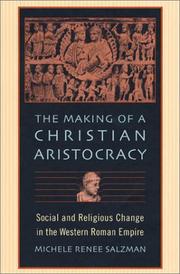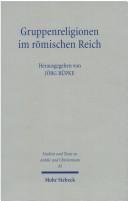| Listing 1 - 10 of 31 | << page >> |
Sort by
|
Book
ISBN: 9783161493133 Year: 2007 Publisher: Tübingen Mohr Siebeck
Abstract | Keywords | Export | Availability | Bookmark
 Loading...
Loading...Choose an application
- Reference Manager
- EndNote
- RefWorks (Direct export to RefWorks)

ISBN: 3515082476 Year: 2003 Volume: 8 Publisher: Stuttgart : Steiner,
Abstract | Keywords | Export | Availability | Bookmark
 Loading...
Loading...Choose an application
- Reference Manager
- EndNote
- RefWorks (Direct export to RefWorks)
Arianism --- Arianisme --- 27 <37> "03" --- Kerkgeschiedenis--Rome. Oud-Italië--?"03" --- Arianism. --- Church and state --- Church history --- History --- Christian heresies --- Primitive and early church, ca. 30-600 A.D. --- Bishops --- Temporal power --- Église et État --- Histoire religieuse

ISBN: 0674006410 0674016033 Year: 2002 Publisher: Cambridge, Mass. London : Harvard University Press,
Abstract | Keywords | Export | Availability | Bookmark
 Loading...
Loading...Choose an application
- Reference Manager
- EndNote
- RefWorks (Direct export to RefWorks)
Christian converts --- Aristocracy (Social class) --- Christian sociology --- Church history --- Social change --- Convertis chrétiens --- Aristocratie --- Sociologie religieuse --- Eglise --- Changement social --- Religious life --- History --- Vie religieuse --- Christianisme --- Histoire --- Sociology, Christian --- 27 <37> --- -Aristocracy (Social class) --- -Christian sociology --- -Christian social theory --- Social theory, Christian --- Sociology --- Aristocracy --- Aristocrats --- Upper class --- Nobility --- Christians --- Converts --- Kerkgeschiedenis--Rome. Oud-Italië --- -History --- Social conditions. --- -Kerkgeschiedenis--Rome. Oud-Italië --- -27 <37> --- -Christian converts --- Convertis chrétiens --- Social conditions --- Rome --- Primitive and early church, ca. 30-600 A.D.

ISBN: 0198269838 0191683825 1280446080 9780198269830 Year: 2000 Publisher: Oxford New York Oxford University Press
Abstract | Keywords | Export | Availability | Bookmark
 Loading...
Loading...Choose an application
- Reference Manager
- EndNote
- RefWorks (Direct export to RefWorks)
Church history --- Eglise --- Histoire --- Italy, Northern --- Italie (Nord) --- Church history. --- Histoire religieuse --- 27 <37> "00/04" --- Kerkgeschiedenis--Rome. Oud-Italië--?"00/04" --- -Northern Italy --- -Kerkgeschiedenis--Rome. Oud-Italië--?"00/04" --- Apostolic Church --- Christianity --- Church, Apostolic --- Early Christianity --- Early church --- Primitive and early church --- Primitive Christianity --- Fathers of the church --- Great Apostasy (Mormon doctrine) --- Northern Italy --- Italy [Northern ] --- Primitive and early church, ca. 30-600 A.D. --- Church history - Primitive and early church, ca. 30-600 --- Italy, Northern - Church history

ISBN: 0415138922 0415138930 9780415138925 Year: 2000 Volume: *7 Publisher: London : Routledge,
Abstract | Keywords | Export | Availability | Bookmark
 Loading...
Loading...Choose an application
- Reference Manager
- EndNote
- RefWorks (Direct export to RefWorks)
Roman history --- Christian church history --- anno 1-499 --- Christianity and other religions --- Church history --- Christianisme --- Eglise --- Roman --- Relations --- Religion romaine --- Histoire --- Rome --- Religion --- Roman. --- 27 <37> "03/04" --- -Church history --- -Christianity --- Ecclesiastical history --- History, Church --- History, Ecclesiastical --- History --- Christianity --- Syncretism (Christianity) --- Religions --- Kerkgeschiedenis--Rome. Oud-Italië--?"03/04" --- Religion. --- -Kerkgeschiedenis--Rome. Oud-Italië--?"03/04" --- Apostolic Church --- Church, Apostolic --- Early Christianity --- Early church --- Primitive and early church --- Primitive Christianity --- Fathers of the church --- Great Apostasy (Mormon doctrine) --- Primitive and early church, ca. 30-600 A.D. --- Christianity and other religions - Roman. --- Church history - Primitive and early church, ca. 30-600.
Book
ISBN: 9789004506756 9004506756 9789004507258 9004507256 Year: 2022 Publisher: Leiden ; Boston : ©2022 Brill,
Abstract | Keywords | Export | Availability | Bookmark
 Loading...
Loading...Choose an application
- Reference Manager
- EndNote
- RefWorks (Direct export to RefWorks)
"According to Raúl González Salinero, the plurality of religious expressions within Judaism prior to the predominance of the rabbinical current disproves the assumption according to which some Jewish customs and precepts (especially the Sabbath) prevented Jews from joining the Roman army without renouncing their ancestral culture. The military exemption occasionally granted to the Jews by the Roman authorities was compatible with their voluntary enlistment (as it was in the Hellenistic armies) in order to obtain Roman citizenship. As the sources attest, Judaism did not pose any insurmountable obstacle to integration of the Jews into the Roman world. They achieved a noteworthy presence in the Roman army by the fourth century CE, at which time the Church's influence over imperial power led to their exclusion from the militia armata"--
Jews --- Jewish soldiers --- Jews as soldiers --- Soldiers --- Hebrews --- Israelites --- Jewish people --- Jewry --- Judaic people --- Judaists --- Ethnology --- Religious adherents --- Semites --- Judaism --- History, Military --- History --- Rome --- Rim --- Roman Empire --- Roman Republic (510-30 B.C.) --- Romi (Empire) --- Byzantine Empire --- Rome (Italy) --- Religious aspects. --- Ethnic relations. --- 27 "00/04" --- 27 <37> --- 27 <37> Histoire de l'Eglise--Rome. Oud-Italië --- 27 <37> Kerkgeschiedenis--Rome. Oud-Italië --- Histoire de l'Eglise--Rome. Oud-Italië --- Kerkgeschiedenis--Rome. Oud-Italië --- 27 "00/04" Histoire de l'Eglise--?"00/04" --- 27 "00/04" Kerkgeschiedenis--?"00/04" --- Histoire de l'Eglise--?"00/04" --- Kerkgeschiedenis--?"00/04" --- Religious aspects --- Ethnic relations --- History, Military. --- History.
Book
ISBN: 2204021911 9782204021913 Year: 1984 Publisher: Paris Editions du Cerf
Abstract | Keywords | Export | Availability | Bookmark
 Loading...
Loading...Choose an application
- Reference Manager
- EndNote
- RefWorks (Direct export to RefWorks)
Christian church history --- anno 500-799 --- anno 1-499 --- Histoire ecclésiastique --- Kerkgeschiedenis --- Church history --- Theology --- Eglise --- Théologie --- History --- Histoire --- 27 <37> "00/04" --- #GOSA:II.P.AU.1 --- #GOSA:II.P.Alg.M --- #GGSB: Patrologie (alg.) --- #GGSB: Kerkgeschiedenis (oudheid) --- Kerkgeschiedenis--Rome. Oud-Italië--?"00/04" --- Théologie --- Patrologie (alg.) --- Kerkgeschiedenis (oudheid) --- Eglise - Histoire - ca 30-600 (Eglise primitive)

ISBN: 9783161491283 3161491289 Year: 2007 Volume: 43 Publisher: Tübingen Mohr Siebeck
Abstract | Keywords | Export | Availability | Bookmark
 Loading...
Loading...Choose an application
- Reference Manager
- EndNote
- RefWorks (Direct export to RefWorks)
Religion and sociology --- Church history --- Sociologie religieuse --- Eglise --- Congresses. --- Congresses --- Histoire --- Congrès --- Rome --- Religion --- 27 <37> --- Kerkgeschiedenis--Rome. Oud-Italië --- Cultus. --- Sociale aspecten. --- Romeinse rijk. --- Congrès --- Religion and society --- Religious sociology --- Society and religion --- Sociology, Religious --- Sociology and religion --- Sociology of religion --- Sociology

ISSN: 14363003 ISBN: 9783161493058 3161493052 Year: 2007 Volume: 41 Publisher: Tübingen Mohr Siebeck
Abstract | Keywords | Export | Availability | Bookmark
 Loading...
Loading...Choose an application
- Reference Manager
- EndNote
- RefWorks (Direct export to RefWorks)
Church history --- Paganism --- Education, Ancient --- 27 <37> "00/04" --- 37 <37> --- Kerkgeschiedenis--Rome. Oud-Italië--?"00/04" --- Opvoeding en onderwijs --(algemeen)--Rome. Oud-Italië --- 37 <37> Opvoeding en onderwijs --(algemeen)--Rome. Oud-Italië --- Church history - Primitive and early church, ca. 30-600 --- Education --- Antiquité --- Christianisme --- Paganism. --- Education, Ancient.

ISBN: 0812239873 0812203038 9780812239874 9780812239871 Year: 2007 Publisher: Philadelphia : University of Pennsylvania Press,
Abstract | Keywords | Export | Availability | Bookmark
 Loading...
Loading...Choose an application
- Reference Manager
- EndNote
- RefWorks (Direct export to RefWorks)
Augustine, bishop of Hippo between 395 and 430, and his fellow bishops lived and worked through massive shifts in politics, society, and religion. Christian bishops were frequently asked to serve as intellectuals, legislators, judges, and pastors-roles and responsibilities that often conflicted with one another and made it difficult for bishops to be effective leaders. Expectations of Justice in the Age of Augustine examines these roles and the ways bishops struggled to fulfill (or failed to fulfill) them, as well as the philosophical conclusions they drew from their experience in everyday affairs, such as oath-swearing, and in the administration of penance. Augustine and his near contemporaries were no more or less successful at handling the administration of justice than other late antique or early medieval officials. When bishops served in judicial capacities, they experienced firsthand the complex inner workings of legal procedures and social conflicts, as well as the fallibility of human communities. Bishops represented divine justice while simultaneously engaging in and even presiding over the sorts of activities that animated society-business deals, litigations, gossip, and violence-but also made justice hard to come by. Kevin Uhalde argues that serving as judges, even informally, compelled bishops to question whether anyone could be guaranteed justice on earth, even from the leaders of the Christian church. As a result, their ideals of divine justice fundamentally changed in order to accommodate the unpleasant reality of worldly justice and its failings. This philosophical shift resonated in Christian thought and life for centuries afterward and directly affected religious life, from the performance of penance to the way people conceived of the Final Judgment.
Christianity and justice. --- Christianisme et justice --- 27 <37> "03/04" --- Religion and justice --- Kerkgeschiedenis--Rome. Oud-Italië--?"03/04" --- Justice, Administration of --- Bishops --- Justice --- Evêques --- Administration --- Augustine, --- Christianity and justice --- Religion and law --- Social justice --- Religious aspects. --- Ancient Studies. --- Classics. --- History.
| Listing 1 - 10 of 31 | << page >> |
Sort by
|

 Search
Search Feedback
Feedback About
About Help
Help News
News